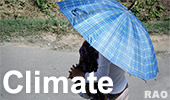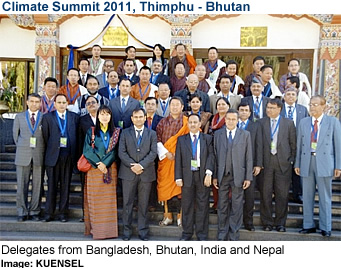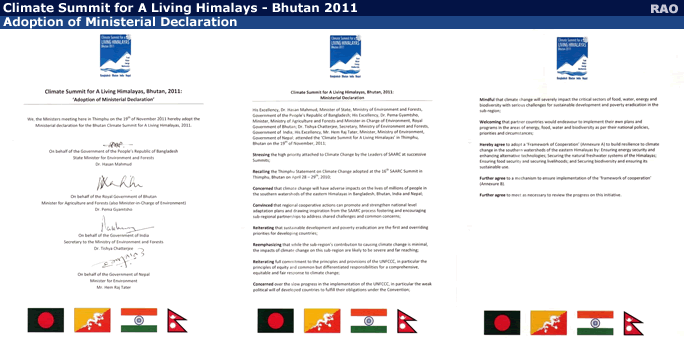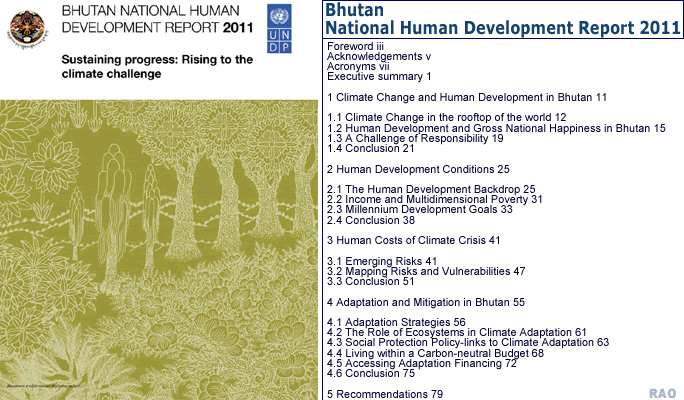 |
Bhutan Climate |
 |
Bhutan Information |
|
|
 |
|
The Bhutan Climate Summit for A Living Himalayas 2011
|
|
The Bhutan Climate Summit for A Living Himalayas, concludes successfully
|

|
19th November 2011
The Bhutan Climate Summit for A Living Himalayas was successfully convened in Thimphu today. Presided over by the Honourable Prime Minister of Bhutan, Lyonchhoen Jigmi Y Thinley; Environment Ministers from the four countries of Bangladesh, Bhutan, India and Nepal adopted a declaration on behalf of their Governments wherein a regional 'framework of cooperation' was agreed upon.
 |
| His Excellency, Dr. Hasan Mahmud, Minister of State, Ministry of Environment and Forests, Government of the People's Republic of Bangladesh; His Excellency, Dr. Pema Gyamtsho, Minister, Ministry of Agriculture and Forests and Minister-in-Charge of Environment, Royal Government of Bhutan; Dr. Tishya Chatterjee, Secretary, Ministry of Environment and Forests, Government of India; His Excellency, Mr. Hem Raj Tater, Minister, Ministry of Environment, Government of Nepal attended the Summit.
|
|
The 'Framework of Cooperation' is aimed at implementing regional cooperative actions to build resilience to climate change in the southern watersheds of the eastern Himalayas by: Ensuring energy security and enhancing alternative technologies; Securing the natural freshwater systems of the Himalayas; Ensuring food security and securing livelihoods; and Securing biodiversity and ensuring its sustainable use.
Further a mechanism to implement the 'Framework of Cooperation' was also agreed to. The Summit was also attended by diplomatic missions within Bhutan and international observers.
top
|
Eastern Himalayan nations reach base camp on regional climate deal?
|

|
The nations of Bhutan, Nepal, India and Bangladesh have signed a regional climate change adaptation declaration that will see wide-ranging collaboration on energy, water, food and biodiversity issues, a deal that could lead the way to similar climate adaptation plans being implemented to cover other threatened ecosystems.
"The success of our initiative will not only have direct and immediate benefits for our own people, but we could be setting a worthy precedent for other countries that share similar conditions," said Bhutan's Prime Minister Lyonchhoen Jigmi Y. Thinley.
The declaration was signed at the Climate Summit for a Living Himalayas - Bhutan 2011, a two-day summit that brought high-level government officials, NGOs, leaders of civil society, and youth ambassadors from the four Eastern Himalayan nations to Bhutan's capital, Thimphu to work out a deal on energy security, natural freshwater systems, food security, and biodiversity across the region.
Energy framework
The four nations broadly agreed to combine powers to increase access to "affordable and reliable" clean energy resources and technology through a regional knowledge sharing mechanism. This would include diversification of energy supply, improved regional connectivity for electricity and natural gas, as well as efforts to enhance energy efficiency across the Eastern Himalayas.
Natural freshwater systems
Agreements on water security - the most contentious are of the Summit declaration - were somewhat diluted, but the four nations did manage to see eye to eye on future activities including collaborative ecosystem and disaster management, knowledge sharing in water use efficiency, and improving understanding of impacts of climate change on water resources across the region.
Food and livelihoods
Consensus was also reached on food security and securing livelihoods, with the deal covering adaptive approaches to improving and sustaining food production, promoting systems that help vulnerable communities gain better access to nutritious food, as well as regional knowledge sharing and capacity building.
Biodiversity and sustainable use
"The framework of cooperation will see the creation of an interconnected mosaic of conservation spaces across the Eastern Himalayas, crucial for communities that rely on the region's natural resources for their survival and the protection of endangered species such as the snow leopard," said Liisa Rohweder, CEO of WWF Finland
"These kinds of regional initiatives are really needed - we should take this as a positive example for COP 17 in Durban, and for the upcoming Rio + 20 conference," she added.
New economic paradigm
Bhutan's Prime Minister also made an urgent call to create a new global economic paradigm that takes the value of natural capital, ecosystem services, and social well-being into account for a sustainable future.
"We need to adopt a full course natural accounting system which will in all probability show us clearly that our economy is only as healthy as the ecosystem services and natural resources that sustain our life on earth and power our economies," Prime Minister Lyonchhoen Jigmi Y. Thinley said during his keynote address.
He added that solutions to the broader issues of climate change, global warming and sustainability were unlikely to emerge from the upcoming climate talks in Durban later this month, instead saying the way forward lies with the Rio + 20 summit in 2012:
"With COP 17 unlikely to yield any earth-shaking results, our hopes are pinned on the Rio +20 Summit. It is at this event that every nation and region must be prepared to play an active and committed part," the Bhutanese Prime Minster stated.
| Hindu Kush-Himalayan (HKH) region |
 |
top
top
|
Report
|
 |
top
| Links
|
 |
 |
 |
External
links |
 |
| Bhutan's Glacial Lakes and GLOF |
 |
| Information on Bhutan |
 |
|







